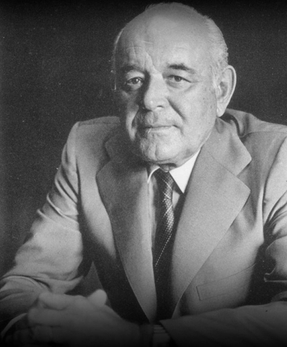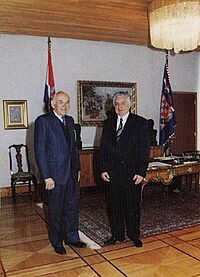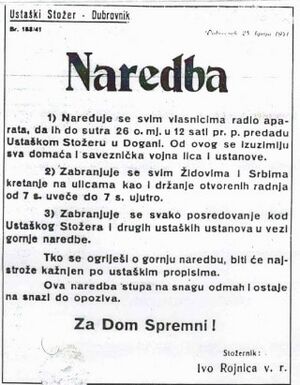Ivo Rojnica facts for kids
Quick facts for kids
Ivo Rojnica
|
|
|---|---|

A portrait of Rojnica in his later years
|
|
| Authorized Representative of the President of Croatia to Argentina and Latin America | |
| In office 1991–1994 |
|
| Ustaše Commissioner of Dubrovnik | |
| In office 23 May 1941 – 12 December 1941 |
|
| Preceded by | Position established |
| Succeeded by | Vlado Herceg |
| Personal details | |
| Born | 20 August 1915 Cista, Imotski, Kingdom of Dalmatia |
| Died | 1 December 2007 (aged 92) Buenos Aires, Argentina |
| Spouse | Ana Rojnica |
| Awards |
|
| Military service | |
| Allegiance |
|
| Branch/service |
|
| Years of service | 1941–1945 |
| Rank | Lieutenant |
| Battles/wars | World War II in Yugoslavia |
Ivo Rojnica (born August 20, 1915 – died December 1, 2007) was a Croatian official and spy. He was active in the Independent State of Croatia (NDH) during World War II. This state was a puppet state supported by the Axis powers from 1941 to 1945. After the war, he moved to Argentina. There, he became a successful businessman and diplomat.
Rojnica joined the Ustaše movement in 1939. This was a fascist and Croatian nationalist group. In April 1941, after the NDH was formed, he became the commissioner (leader) of Dubrovnik. In this role, he carried out the Ustaše's harsh rules against Serbs and Jewish people. He ordered limits on their freedom. Many people were killed or sent to camps under his watch. After being removed from his post, he worked as a spy for the rest of the war. He even received an award from the Ustaše leader, Ante Pavelić. In May 1945, Rojnica escaped to Italy. He was arrested by the British Army. To avoid being sent back to Yugoslavia, he pretended to have a mental breakdown. He was moved to a hospital with weak security and managed to escape.
In 1947, Rojnica went to Argentina using a fake name. He became an Argentine citizen in 1951. He started a textile factory and became a successful businessman. He was also active in the Croatian community in Argentina. He helped start several cultural groups and publications. He even received an award from the Holy See (the Pope's government) for his good deeds. However, he was also thought to have helped pay for some Croatian nationalist aircraft hijackings in the 1970s. In 1977, he was arrested in New Zealand but was later released.
Rojnica was a close friend of Argentine President Carlos Menem. In 1991, he became the official representative of the President of Croatia to Argentina and Latin America. During the Yugoslav Wars, he helped send weapons from Argentina to Croatia. This was against a United Nations ban on arms. In 1993, the Government of Croatia wanted to make him their ambassador to Argentina. This happened even though the Simon Wiesenthal Center asked for his arrest. The case became well-known when a Croatian newspaper published a copy of his anti-Serb and anti-Jewish order from 1941. Croatia then changed its mind about making him ambassador. Rojnica, however, said he would do everything again. He died in Buenos Aires in 2007 at age 92. He was never charged or put on trial for his actions.
Contents
Early Life and Beginnings
Ivo Rojnica was born on August 20, 1915. His birthplace was the village of Cista, near Imotski. This area was part of Austria-Hungary at the time, but is now in Croatia. He was one of eleven children. As a young man, he moved to Dubrovnik, a coastal town. There, he finished high school and opened a textile business. In 1939, he joined the Ustaše movement. This group was led by Ante Pavelić and was known for its fascist and Croatian nationalist ideas.
World War II Activities
Before the Axis powers invaded Yugoslavia, Rojnica worked as a spy for Germany's military intelligence, the Abwehr. His secret name was "Ante." After Yugoslavia was invaded and taken over, the Axis powers created a new state. It was called the Independent State of Croatia (NDH) and was ruled by the Ustaše. This state included most of modern-day Croatia, all of Bosnia and Herzegovina, and parts of Serbia.
On May 23, 1941, Rojnica became the commissioner (Croatian: Stožernik) of Dubrovnik. On the same day, local Ustaše began arresting and killing people who opposed them. This included members of the Communist Party of Yugoslavia. Serbs and Jews were also targeted. Jewish people were forced to wear a yellow star and mark their homes with the Star of David.
In June 1941, Rojnica issued a strict order. It said that Jewish and Serb people in Dubrovnik could not walk on the streets or keep their shops open from 7 p.m. to 7 a.m. The order also said that anyone who broke this rule would be punished. Many Serbs and Jews who could not escape Dubrovnik were killed or sent to concentration camps like Jasenovac. Rojnica was removed from his position on December 12, 1941. He was replaced by Vlado Herceg. For the rest of the war, Rojnica continued to work as a spy. In 1943, he was promoted to lieutenant in the Ustaše Militia. Pavelić also gave him an award for his service.
Life in Exile: Argentina
In May 1945, as the war ended, Rojnica fled to Italy. He used the fake name Ivan Rajčinović. In May 1946, the British Army arrested him. Yugoslav officials sent the British a detailed report of his wartime actions. It included a list of 58 people killed under his orders. Fearing he would be sent back to Yugoslavia, Rojnica pretended to have a mental breakdown. He was moved to a hospital with loose security and managed to escape.
In 1947, Rojnica arrived in Argentina as a hidden passenger on a ship. His escape was helped by Krunoslav Draganović, a Catholic priest who organized secret routes for war crime suspects to leave Europe. Rojnica entered Argentina using his fake name. His family joined him later that year. They settled in a suburb of Buenos Aires, where Rojnica opened a textile factory. In 1951, he became an Argentine citizen. He later legally changed his name to Juan Rojnica.
Rojnica became very active in the Croatian community in Argentina. He helped create several cultural groups and publications. He also financially supported the Croatian Review, a quarterly journal. He wrote articles for this journal and another one called The Morning Star. The Holy See gave him the Order of St. Gregory the Great for his charity work.
Despite his own role in The Holocaust, Rojnica tried to do business with Jewish people in Argentina and Israel. In his memoirs, he claimed that the Ustaše did not plan to kill all Serbs. He also said that Germans were solely responsible for The Holocaust in Croatia. These claims are different from what most historians believe.
Rojnica was suspected of helping to pay for several Croatian nationalist aircraft hijackings in the 1970s. In 1977, he was briefly detained in New Zealand with another former Ustaše official, Vjekoslav Vrančić. Yugoslavia asked for them to be sent back, but they were released and returned to Argentina.
Later Years and Diplomatic Role

In 1991, Rojnica was appointed as the Authorized Representative of the President of Croatia to Argentina and Latin America. This happened during the breakup of Yugoslavia and the start of the Croatian War of Independence. Rojnica was a close friend of Carlos Menem, who was the President of Argentina. Rojnica used this friendship to illegally get weapons from Argentina for Croatia. This was against a United Nations ban on arms.
In early 1992, a group called the Simon Wiesenthal Center asked Argentine officials to arrest Rojnica. They said he was on a list of war crime suspects hiding in Argentina. But the Argentine authorities did not investigate him. Rojnica continued to be seen with President Menem. In July, he even went with Menem on an official visit to Zagreb, Croatia.
In February 1993, the Government of Croatia announced it wanted to make Rojnica their ambassador to Argentina. This news caused many complaints and protests. The case gained a lot of attention when a Croatian newspaper published a copy of Rojnica's anti-Jewish and anti-Serb order from 1941. Despite the controversy, some Croatian officials and clergy defended him. However, due to public criticism, the Croatian President, Franjo Tuđman, changed his mind. Rojnica himself was not sorry for his actions. He told the newspaper, "everything I did in 1941 I would do again."
Rojnica continued his diplomatic role until 1994. That year, his memoirs were published in Croatia. In November 1994, President Tuđman gave him the Order of Duke Trpimir. This award was for "promoting the reputation of the Republic of Croatia in Argentina."
Final Years and Death
In 1998, the Simon Wiesenthal Center again asked for Rojnica to be charged and sent back to Croatia for trial. But they received no answer from Argentina. The Argentine press suggested that Rojnica's freedom was due to large financial gifts from former Ustaše members to Menem's election campaigns. Rojnica denied making any such gifts. Croatian officials said they did not have enough evidence to charge him.
Rojnica became a focus of media attention again in May 1998. This was after Dinko Šakić, a former commander of the Jasenovac concentration camp, was arrested in Argentina. In an interview, Rojnica admitted he was the Ustaše commissioner of Dubrovnik. But he denied the war crime accusations, calling them "a big lie invented by the Serbs and by the communists." He added, "I am a hero of Croatia!"
In 2001, Efraim Zuroff, a director at the Simon Wiesenthal Center, listed Rojnica as one of eight "major Nazi war criminals" still free. Rojnica died in Buenos Aires on December 1, 2007, at the age of 92. He was buried the next day. A representative of a Croatian Jewish organization expressed sadness that Rojnica was never charged or put on trial.
Rojnica's grandson, Ivo Esteban Rojnica, later became a well-known currency trader in Argentina. He was arrested in October 2023.
Images for kids
-
Rojnica with Croatian President Franjo Tuđman




